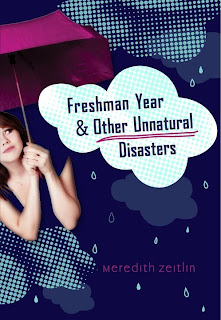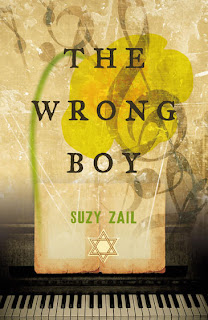Received from the Publisher
From the BLURB:
Kelsey Finkelstein is fourteen and FRUSTRATED. Every time she tries to live up to her awesome potential, her plans are foiled – by her impossible parents, her annoying little sister, and life in general. But with her first day of high school coming up, Kelsey is positive that things are going to change. Enlisting the help of her three best friends — sweet and quiet Em, theatrical Cass, and wild JoJo — Kelsey gets ready to rebrand herself and make the kind of mark she knows is her destiny. Things start out great - her arch-nemesis has moved across the country, giving Kelsey the perfect opportunity to stand out on the soccer team and finally catch the eye of her long-time crush. But soon enough, an evil junior’s thirst for revenge, a mysterious photographer, and a series of other catastrophes make it clear that just because KELSEY has a plan for greatness… it doesn’t mean the rest of the world is in on it.
Some are born popular, some achieve popularity, and others (like Kelsey Finkelstein) intend to thrust themselves into popularity in their freshman year of high school. Or, at least, that was the plan.
‘Freshman Year & Other Unnatural Disasters’ is the debut young adult novel by Meredith Zeitlin.
Sometimes I think I might be getting a little too old for certain YA books… I don’t get ‘Bieber fever’, I have no intentions of listening to ‘One Direction’ and I have started asking sales assistants to “please turn the music down just a smidge?” in clothes shops. Then a book comes along that reminds me I can still be young at heart, and live vicariously (and happily) through a character and be transported back to a time when high school was the be all and end all. ‘Freshman Year & Other Unnatural Disasters’ is just such a book, and Kelsey Finkelstein is just such a protagonist.
When the book opens, things are looking up for Kelsey. She has grand plans and high hopes – her arch nemesis has moved away, she’s going to be the star of her school soccer team and resident boy-crush, Jordan, is in her sights. High school, Kelsey is sure, is going to be the turning point in her life…
Kelsey Finkelstein is fourteen and FRUSTRATED. Every time she tries to live up to her awesome potential, her plans are foiled – by her impossible parents, her annoying little sister, and life in general. But with her first day of high school coming up, Kelsey is positive that things are going to change. Enlisting the help of her three best friends — sweet and quiet Em, theatrical Cass, and wild JoJo — Kelsey gets ready to rebrand herself and make the kind of mark she knows is her destiny. Things start out great - her arch-nemesis has moved across the country, giving Kelsey the perfect opportunity to stand out on the soccer team and finally catch the eye of her long-time crush. But soon enough, an evil junior’s thirst for revenge, a mysterious photographer, and a series of other catastrophes make it clear that just because KELSEY has a plan for greatness… it doesn’t mean the rest of the world is in on it.
Some are born popular, some achieve popularity, and others (like Kelsey Finkelstein) intend to thrust themselves into popularity in their freshman year of high school. Or, at least, that was the plan.
‘Freshman Year & Other Unnatural Disasters’ is the debut young adult novel by Meredith Zeitlin.
Sometimes I think I might be getting a little too old for certain YA books… I don’t get ‘Bieber fever’, I have no intentions of listening to ‘One Direction’ and I have started asking sales assistants to “please turn the music down just a smidge?” in clothes shops. Then a book comes along that reminds me I can still be young at heart, and live vicariously (and happily) through a character and be transported back to a time when high school was the be all and end all. ‘Freshman Year & Other Unnatural Disasters’ is just such a book, and Kelsey Finkelstein is just such a protagonist.
When the book opens, things are looking up for Kelsey. She has grand plans and high hopes – her arch nemesis has moved away, she’s going to be the star of her school soccer team and resident boy-crush, Jordan, is in her sights. High school, Kelsey is sure, is going to be the turning point in her life…
JoJo gives me a raised eyebrow. “What’s going on, Kels? You have some big plan in mind or something?”
“No, not really. Just… well, we’re in high school now. Obviously. And… it’s time to defy expectations! To… change people’s perceptions of us! I mean, I just feel like this year could be–”
“High school is still school, you know,” JoJo scoffs. “Lame, unlikely to result in anything useful, and–”
“Anyway, I’ve decided to really…do something this year. To make a mark. Stand out. Revamp myself for a new era. You know, like Lindsay Lohan.”
“You want to go to jail?” Cass asks, looking perplexed.
I sigh. “You’re killing me, Cass.”
And then it all goes horribly wrong, naturally… Kelsey is betrayed by one of her best friends. She’s cast as a bearded fat man in her school play and she lost an arch nemesis, only to gain a new one in high school. So much for grand plans and high hopes.
Zeitlin’s book is a frolicking joy ride through the pitfalls of high school, but it’s also a book to prompt reminiscence. Kelsey’s story is a page-turner, mostly because her bumbling ways will hark you back to your own high school days… back then crushes seemed like true love, best friend betrayals felt like the end of the world and being a social outcast was like being exiled to Siberia. For those of us who are not American, ‘freshman year’ is equivalent to ninth grade in high school – while reading Zeitlin’s book I did find myself getting caught up in the minutiae of school politics and battlegrounds. That vicarious empathy is, in large part, thanks to Kelsey’s incredible narrative voice – she’s so charismatic and naïve, sometimes painfully innocent and absurdly optimistic that you do find yourself cheering her on throughout the book.
The characters in this book are to-die-for awesome. Kelsey’s besties are Em, Cass & JoJo and they’re a laugh riot together. And then there was Kelsey’s uber-embarassing family to cap off the hilarity. But my favourite character was Ben – the nice guy who shares many a witty repartee with Kelsey.
‘Freshman Year & Other Unnatural Disasters’ is a squirm-inducing, chortle-fest of loveliness. This is just one of those great books that has a little something for everyone. Younger readers will find a hilarious comrade in Kelsey Finkelstein, as she navigates the murky waters of high school. Older readers will enjoy a cringe-worthy reminiscence to their own high school days, and fondly read Kelsey bumbling along her way to discovering what really matters in life.
5/5


















